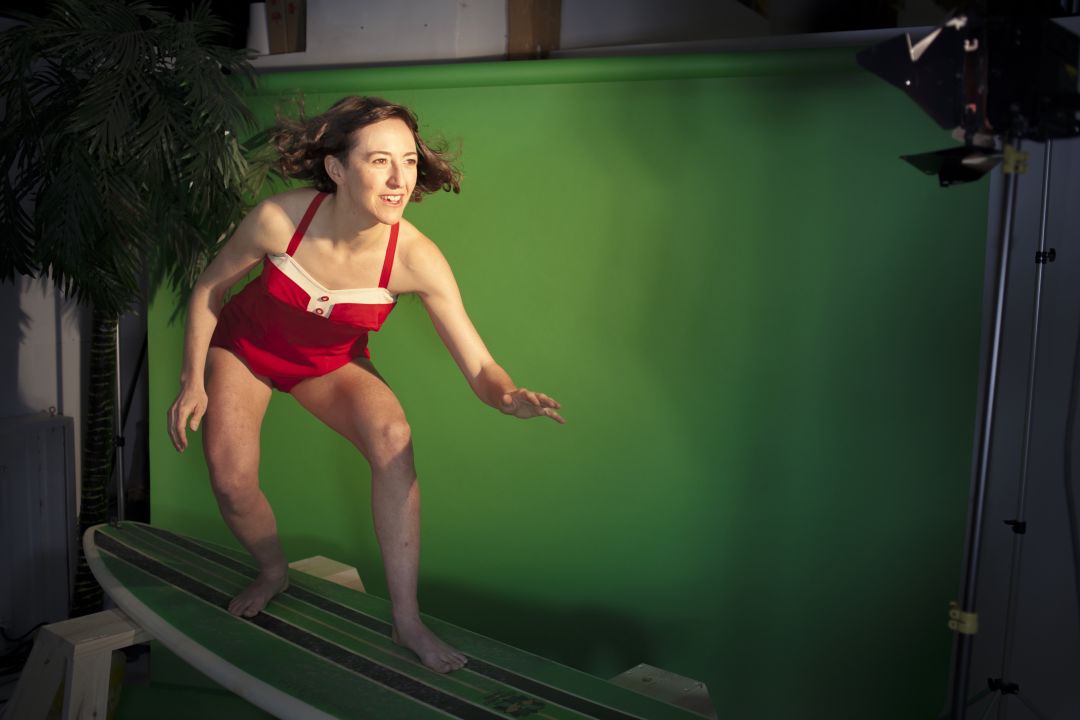Other Inland Empires Surfs from SoCal to Slovakia

Theater artist Julie Hammond
Image: Courtesy Vilhelm Sundin
What do Sally Field, Sandra Dee, and Pacific Northwest theater artist Julie Hammond have in common? They’ve all played Gidget (or variations thereof), the prototypical midcentury beach queen oft associated with the glitz and gleam of California surf culture.
“She was tiny and blonde and super cheerful. A big thing for me was the blonde part,” says Hammond, whose fascination with the original Malibu Barbie has spanned over a decade. “But it turns out that Gidget was based on a real person—Kathy Kohner, the daughter of Austro-Hungarian Jewish refugees.”
Hammond stumbled on the information in a 2008 Believer essay, “Gidget on the Couch,” by cultural critic Peter Lunenfeld. That essay doesn’t treat Gidget’s Semitic origins as breaking news. Still, the revelation stirred Hammond, who shelved the connection for eight years before hauling it front and center for a series of experimental theater pieces. The culmination of those pieces, Other Inland Empires, comes to Portland for the first time this week. It runs June 26–30 at Portland Playhouse with production support from Hand2Mouth, with whom Hammond has a decade-long history.
“It felt important for me to bring this work to Portland,” says Hammond, who just spent three years in Vancouver, B.C., earning her MFA in interdisciplinary studies. “It’s the place where I’ve grown up artistically. This is a way to come back to the city and share what I’ve been up to.”
Quite a lot, it turns out. Spurred by Lunenfeld’s essay, Hammond considered her own history: she was born in surf-crazed Loma Linda, California. Her maternal grandparents were Austro-Hungarian Jewish refugees. Her uncle was a surfer and experienced early-onset hearing loss. It could’ve been genetic, but Hammond was drawn to an apocryphal family story that he lost his hearing to the waves.
“It’s all part of the family myth-making that I’ve chosen not to fact-check,” she says.
Determined to mine the echoes of her own story in the Gidget/Kohner origin myth, Hammond decided in 2016 to travel to Slovakia (her grandmother’s landlocked home country) and learn to surf.
“I thought that if this young woman from Central Europe had been a key player in the teenage surf culture revolution, then somehow I, who was born in Southern California and didn’t know how to surf, could go to Central Europe and learn to surf and somehow that would give me all these answers about my family,” she says.
As these stories often go, Hammond didn’t find the exact answers she was looking for, but she did stumble on some fascinating questions. Her month-long trip took her to Germany’s Tropical Islands Resort, an indoor beach facsimile in a former Nazi air hangar replete with live flamingoes, a 100-foot blue-sky backdrop, and air-conditioned rooms that provide relief from artificially achieved 80-degree temperatures elsewhere at the theme park. She also ended up wakeboarding (not surfing) in Slovakia and suffering a traumatic dental injury. Both drew her closer to questions about her grandmother, a Holocaust survivor, and the ways different cultures borrow from one another to sand and soften their sins.
The result is a tantalizing one-act play that dips and weaves between memoir and flights of fancy. With live music, beach chair seating, and an extended sequence centered around Hammond’s anthropomorphic tooth, Other Inland Empires is a challenging experiment that “shimmers” (Hammond’s word) between fantasy and reality. Hammond says it’s deeply personal—an overused word, perhaps, but one that fits the scale of the project. She performed in the show’s earliest iterations, but has since cast a series of actresses in her place.
“I feel like I’m not quite done with it, and like I never ever want to do it again,” Hammond says, laughing.
The ambivalence is very Gidget. In 1968’s Gidget Goes to New York, the board-strapped heroine famously mused: “Life, I think, is wonderful, but people are hell.”
Other Inland Empires
7:30 p.m. Wed–Sat, 5 p.m Sun, Portland Playhouse, $10–40




